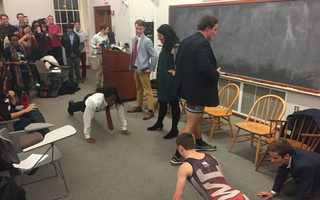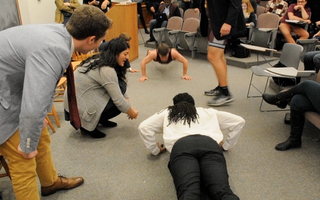Clad in a crimson-colored wrestling unitard, Undergraduate Council presidential candidate Nick E. Gajdzik ’16-’17 cradles his much smaller running mate, Jeffrey M. Ott ’16-’17, in a promotional campaign poster shared on Facebook.
When it comes to physique, more than 100 pounds in weight and 10 inches in height separate varsity wrestlers Gajdzik and Ott, but when it comes to their relationship, the mismatched duo is quite close.
“In wrestling, it’s almost a phenomenon where the big guys and the smallest guys always hang out with each other,” Gajdzik said.
If elected, Gajdzik and Ott would be the first varsity athletes to serve as president and vice president of the UC in years, which, Gajdzik said, was “one of the big things that inspired us to run.” The pair, the only ticket running for UC leadership without any prior experience on the body, touts a campaign platform that focuses on the experiences of student-athletes in addition to other general issues such as campus social life and sexual assault prevention.
“We feel like it’s a voice that’s been left out of the conversation for the last decade or so,” Gajdzik said. “We want to address that by bringing in a new perspective.”
Bonding freshman year as wrestling recruits from different parts of the country, Gajdzik and Ott now share a small double in Kirkland House.
“Their beds are only six inches apart. They’re separated by a fan,” said Nick J. Stager ’16, one of Ott and Gajdzik’s blockmates. “So when you talk about putting heads together, they’re doing it in a very literal sense.”
{shortcode-a45debd60a05c807df7b05e7435147bbe459ea90}
Gajdzik, a Government concentrator, describes himself as a “Midwest boy through and through.” Before coming to Harvard, Gajdzik lived in Ohio and Michigan, where, following in his family’s tradition, he played football. Gajdzik said his temperament was too mild for football, so his father suggested he try wrestling to become more aggressive. After discovering his talent for the sport, though, Gajdzik remained a wrestler.
“I’m sort of the black sheep of the family on this one,” Gajdzik said. “Both my uncle and dad played college football; my little brother plays football at the University of Chicago.”
Ott, who studies psychology, grew up in Massachusetts and was homeschooled from first to sixth grade, a period Ott describes as particularly formative.
“A lot of the eccentricities that I am very proud of and enjoy now were formed during my homeschool years,” Ott said. Among these quirks is Ott’s love of birdwatching, an activity he often pursues in Harvard Yard and in Mount Auburn Cemetery.
“It’s so peaceful—it’s the most tranquil experience I can imagine,” Ott said, calling himself “one of four birdwatchers on campus.”
Both Gajdzik and Ott took leaves of absences last year to pursue their wrestling careers outside of the collegiate setting. Gajdzik honed his wrestling skills at a regional Olympic training center. Ott planned to train as well, but after an unexpected injury, he ended up spending part of the year as a substitute teacher and part on a trip to Australia and New Zealand.
“My year off gave me so much perspective on how important this place is, and how much opportunity we have here to be great in anything we want,” Gajdzik said, referring to Harvard. “After a while, you lose sight of all this place has to offer.”
Their rediscovered appreciation for Harvard helped identify areas where they claim the College falls short of its promise.
“This place definitely has its faults, and that’s why we’re running for UC,” Gajdzik said. “There are things right now that are getting in people’s way of prospering, and that shouldn’t be the case.”
Unlike the other two tickets, each of which includes at least one current or former UC representative, neither Gajdzik nor Ott has served on the UC, a fact they argue will not will disadvantage them if they are elected.
“We do have to recognize that we don’t have any experience on the UC, but none of the other candidates ha[s] been on the UC for more than a year,” Ott said. “There’s going to be a very steep learning curve for whoever is put into this position.”
One ticket has two members — Shaiba Rather ’17 and Daniel V. Banks ’17 — who were both elected to the UC in September 2014. UC presidential candidate William A. Greenlaw ’17 was also elected that September, while his running mate, William F. Morris IV ’17, is an outsider to the UC.
Gajdzik and Ott argue that their position as outsiders gives them an advantage over their more experienced opponents.
{shortcode-9dfa312290383a482b61a5d4b5ce1dac54bffd08}
“When you’re part of a group for so long, you become socialized into that group, and that inevitably limits the kinds of perspectives that can be given,” Gajdzik said. “We think as outsiders we bring in an entirely fresh perspective.”
In creating their UC election platform, Gajdzik and Ott drew on their own experiences as varsity athletes. Some of their goals include extending dining hall hours, ensuring more houses serve hot breakfast, and making it easier for athletes to choose a wide variety of concentrations.
On weekends when teams have games and practices, athletes are often unable to eat the hot meals served only at 11:30 a.m. brunch. Instead, they turn to less wholesome options like granola or cereal.
“Basically we’re forced to go to the d-hall, eat some super…sugary cardboard, and then be expected to go out there and perform [our] best, which is incredibly, incredibly tough to do,” Gajdzik said.
Evening practices also prevent many athletes from eating dinner before most dining halls close, according to Gajdzik and Ott. While Currier House and Dunster House have already extended dining hall hours, the UC hopefuls want other Houses to do the same.
Perhaps most significantly, the pair is calling on the College to decrease the number of concentration courses that meet between 3 p.m. and 6 p.m., the window when many varsity teams practice. Expanding the number of courses that meet outside this window would give athletes more flexibility in their choice of concentration, Gajdzik and Ott argue.
“I know plenty of my friends who were kind of pigeonholed to do one of the ‘big three,’” Gajdzik said, referring to the Psychology, Economics, and Government concentrations. Ott said his commitment to varsity wrestling forced him to forgo his first-choice concentration. The pair argues that these proposed policies will benefit not only varsity athletes, but all students.
Even though Gajdzik and Ott’s policy platform has a particular focus on varsity athletes, the pair emphasized their commitment to issues that affect the entire student body. They say they hope to address issues surrounding mental health, sexual assault, and social spaces on campus.
Students often find it difficult to talk about and seek resources for mental health issues because of pervasive stigma, Ott said, noting that he has “struggled” with these problems in the past.
“If there are things bugging me, I don’t really talk about them,” Ott said.
To combat this stigma, Gajdzik and Ott said they want a psychologist to meet with the entryways of every upperclassman House and freshman dorm at the beginning of each school year. In these meetings, Ott said psychologists could reassure students that seeking help is “normal” and “something you shouldn’t feel bad about.”
The pair also said students often feel reluctant to report instances of sexual assault or harassment to administrators. {shortcode-62782081a7647ddd15fb193e67da674c902caf36}
“We need to make sure people feel absolutely 100 percent comfortable that Harvard is going to do all that they can to seek justice for the victims,” Gajdzik said.
Gajdzik and Ott also want the Office of Sexual Assault Prevention and Response to meet with all entryways at the beginning of each year to remind students about resources and reporting mechanisms related to sexual assault.
Discussions about sexual assault that have dominated campus conversation this semester have brought attention to what students call a lack of safe social spaces at Harvard. Gajdzik and Ott have proposed what they describe as ways to make it easier for students and student groups to throw Harvard-sanctioned parties. For example, the two proposed making expedited party forms—for students to apply to host parties on short notice—available in more Houses. {shortcode-c677840fe32179d933ab06d3741ca99e86370804}
Although their platform addresses serious issues on Harvard’s campus, the two have made their campaign “fun,” Ott said. At a UC election debate co-hosted by The Crimson on Saturday, Gajdzik and Ott wore wrestling unitards and challenged the two opposing tickets to a game of water pong and a push-up contest, respectively.
UC presidential candidate William A. Greenlaw ’17 lost the push-up contest to Ott, 80-49.


